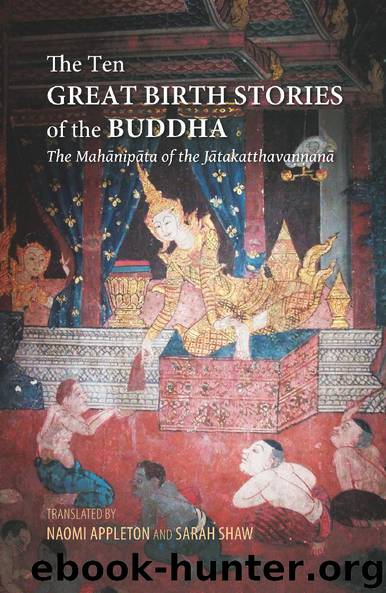Ten Great Birth Stories of the Buddha: The Birth Story of Temiya, or of the Dumb Cripple by Appleton Naomi; Shaw Sarah

Author:Appleton, Naomi; Shaw, Sarah [Books, Silkworm]
Language: eng
Format: epub
Publisher: University of Washington Press
Published: 2016-12-14T18:15:00+00:00
1. Introduced and translated by Naomi Appleton.
The opera is the creation of Thai-American composer Somtow Sucharitkul and stars an international cast. It previewed in Bangkok in December 2012. I am grateful to Jak Cholvijarn, who starred in the role of Temiya, for sending me a DVD of the opera.
2. In the Kusa-jātaka (J 531) the lack of an heir is greatly concerning to the populace and they urge drastic action. Eventually the queen is made available to other men in order that she might conceive a child. In order to save her from this indignity, Sakka in disguise as an old man takes her away to heaven, then grants her two sons.
3. He is said to have been in an ussada hell, which are the supplementary hells that protrude from the great hells.
4. Vajira could also be translated as ‘[Indra’s] thunderbolt’, and given the intimate involvement of Sakka (Indra) in ensuring the queen becomes pregnant, this is certainly a tempting option. However, I have not been able to find any suggestion that such a motif is known to other Indian mythological sources, and so I follow the translation ‘diamonds’ as chosen by Cowell, Dutoit, and Shaw.
5. Literally on the side or flank, in other words the child is breastfed while sitting upright on the woman’s hip.
6. F khalaṃkapādā is obscure, but VRI reads pakkhapādo ‘side-footed’.
7. VRI instead says the milk of one who is too dark is very cold, and the milk of one who is overly white is too hot.
8. VRI has: ‘the milk of women who have a cough is too sour, and the milk of asthmatic women is too bitter and so on.’
9. Saddaṃ suṇāti literally means ‘heard a noise’ but since it is clear from the context that Temiya is not actually deaf, but is pretending to be so, ‘responded to’ seems more appropriate. VRI has saddaṃ karoti ‘made a noise’.
10. For this and all successive descriptions of the tests, the VRI edition has a much longer description, in parallel to the description of the first test, with variations. VRI also specifies the age at which each test was carried out, by indicating, ‘two-year-old children like fruits,’ and so on.
11. Following VRI as well as F’s Burmese manuscript. F is hard to decipher here.
12. VRI: ‘The heat of this fire is a hundred, a thousand, a hundred thousand times better than the burning of the hell-fires!’
13. Nirodha is often used as a synonym for nibbāna.
14. Antaruddhīnaṃ nikkhamanakālo viya is obscure. Cone (PED) suggests antaruddhi equates to Sanskrit antravṛddhi which refers to an inguinal hernia or rupture of the intestines. Shaw follows Cone, translating ‘as if he had had a ruptured hernia’. Cowell says that Temiya ‘looked like a released prisoner’.
15. VRI says that Temiya did not look at them.
16. VRI separates out each of these requests in full, with the king responding in the negative to each one.
17. VRI notes that by means of the goddess’s power and the power of the perfections of the Great Being the charioteer unintentionally yoked auspicious horses to an auspicious cart.
Download
This site does not store any files on its server. We only index and link to content provided by other sites. Please contact the content providers to delete copyright contents if any and email us, we'll remove relevant links or contents immediately.
The Way of Zen by Alan W. Watts(6289)
Ego Is the Enemy by Ryan Holiday(4958)
The Art of Happiness by The Dalai Lama(3847)
The Book of Joy by Dalai Lama(3698)
Why Buddhism is True by Robert Wright(3284)
Spark Joy by Marie Kondo(3087)
Shift into Freedom by Loch Kelly(3029)
Happiness by Matthieu Ricard(2884)
A Monk's Guide to a Clean House and Mind by Shoukei Matsumoto(2783)
The Lost Art of Good Conversation by Sakyong Mipham(2438)
The Meaning of the Library by unknow(2385)
The Third Eye by T. Lobsang Rampa(2172)
The Unfettered Mind: Writings from a Zen Master to a Master Swordsman by Takuan Soho(2158)
Red Shambhala by Andrei Znamenski(2071)
Anthology by T J(2046)
The Diamond Cutter by Geshe Michael Roach(1955)
Thoughts Without A Thinker: Psychotherapy from a Buddhist Perspective by Epstein Mark(1893)
Advice Not Given by Mark Epstein(1763)
Twilight of Idols and Anti-Christ by Friedrich Nietzsche(1762)
